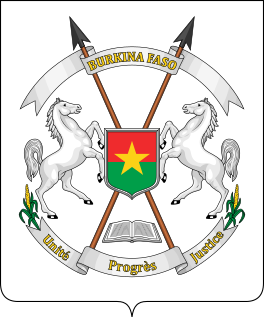
The Politics of Burkina Faso takes place in a framework of a semi-presidential republic, whereby the Prime Minister of Burkina Faso is the head of government, and of a multi-party system. The President of Burkina Faso is the head of state. Executive power is exercised by both the President and the Government. Legislative power is vested in both the government and parliament. The party system was dominated by the Congress for Democracy and Progress (CDP) until the 2014 Burkinabé uprising. Since then, the CDP has lost influence. The Judiciary is independent of the executive and the legislature. The Economist Intelligence Unit rated Burkina Faso as a "hybrid regime" in 2016.

Burkina Faso has good relations with the European Union, African and certain Asian countries. France, the former colonial power, in particular, continues to provide significant aid and supports Compaoré's developing role as a regional powerbroker.

The history of Burkina Faso includes the history of various kingdoms within the country, such as the Mossi kingdoms, as well as the later French colonisation of the territory and its independence as the Republic of Upper Volta in 1960.

Ouagadougou, also Vagaga, is the capital of Burkina Faso and the administrative, communications, cultural, and economic centre of the nation. It is also the country's largest city, with a population of 2,200,000 in 2015. The city's name is often shortened to Ouaga. The inhabitants are called ouagalais. The spelling of the name Ouagadougou is derived from the French orthography common in former French African colonies.

The culture of Burkina Faso in West Africa is also called the Burkinabé culture.
The Federation of Green Parties of Africa is an umbrella body of the various national Green parties and environmental parties in Africa.
The Committee on Gender, Family, Youths and People with Disabilities is one of the ten permanent committees of the Pan-African Parliament. It concentrates on issues concerning women, family and people and children with disabilities.
Bénéwendé Stanislas Sankara is a Burkinabé politician and the President of the Union for Rebirth/Sankarist Movement (UNIR/MS) party.
Marie Blandine Sawadogo is a member of the Pan-African Parliament from Burkina Faso.
Gilbert Noël Ouédraogo is a Burkinabé politician who has been President of the Alliance for Democracy and Federation–African Democratic Rally (ADF-RDA), a political party in Burkina Faso, since 2003. He served in the government of Burkina Faso as Minister of Social Action and National Solidarity from 2000 to 2002 and as Minister of Transport from 2006 to 2013. He was the Fourth Vice-President of the National Assembly of Burkina Faso from 2013 to 2014.
Larba Yarga was the Minister of Justice for Burkina Faso until approximately 2000. He also served as a member of the Pan-African Parliament from Burkina Faso.

Presidential elections were held in Burkina Faso on 21 November 2010. Incumbent president Blaise Compaoré was re-elected with 80% of the vote. The elections were marred by claims of widespread fraud.

Burkina Faso–Denmark relations refers to the current and historical relationship between Burkina Faso and Denmark. Burkina Faso has an embassy in Copenhagen, and Denmark has an embassy in Ouagadougou.

Parliamentary elections were held in Burkina Faso on 2 December 2012. They were the first elections held since the National Assembly dissolved the National Electoral Commission in 2011, following fraud allegations concerning the 2010 presidential elections. Municipal elections for over 18,000 councillors were held simultaneously. The elections were held amidst a period of political uncertainty, following protests against President Blaise Compaore's regime.

Sankarism is a term sometimes applied to denote a left-wing ideological trend within the political milieu of Burkina Faso, a landlocked country in West Africa, as well as the policies of the military government led by Captain Thomas Sankara. Sankara came to power in what was then the Republic of Upper Volta in a popularly-supported 1983 military coup, and ruled until his assassination in a coup led by Blaise Compaoré in 1987.

The Burkinabé uprising was a series of demonstrations and riots in Burkina Faso in October 2014 that quickly spread to multiple cities. They began in response to attempts at changing the constitution to allow President Blaise Compaoré to run again and extend his 27 years in office. Pressure for political change came from civil society and in particular from the country’s youth. Following a tumultuous day on 30 October, which included the involvement of former Defence Minister Kouamé Lougué and the burning of the National Assembly and other government buildings as well as the ruling Congress for Democracy and Progress party's headquarters, Compaoré dissolved the government and declared a state of emergency before eventually fleeing to Côte d'Ivoire with the support of President Alassane Ouattara.

Burkina Faso–India relations refers to the international relations that exist between Burkina Faso and India. Burkina Faso maintains an embassy in New Delhi. India maintained an embassy in Ouagadougou from November 1996 until its closure in July 2002. Currently, India maintains an honorary consulate in Ouagadougou, which functions under the jurisdiction of the High Commission of India in Accra, Ghana.







